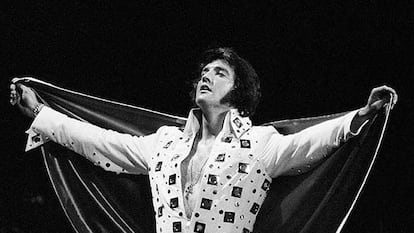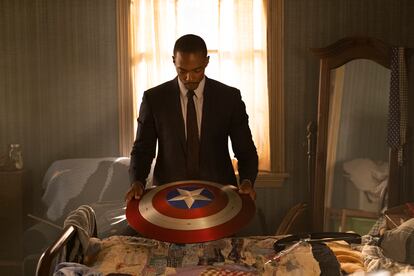Fame is not what it used to be: Why stars like Marilyn and Elvis don’t exist anymore
In a world consumed by social media influencers and superheroes, the film industry is wallowing in nostalgia for the great icons of yesteryear

It happens more often now, even to people well versed in pop culture: one day, you discover that you don’t know half of the actors and actresses featured in the Hollywood issue that Vanity Fair puts out to coincide with the Oscars. Who is that actress next to Nicole Kidman? No idea. Who is at the top of Billboard’s Hot 100? No clue (Morgan Wallen, Steve Lacy). Emma Chamberlain’s house goes viral, and we are not quite clear about who she is, let alone what the 21-year-old has done to earn enough money to buy a $4.3 million mansion (answer: she is a social media phenomenon who has signed deals with Levi’s, Cartier and Louis Vuitton). This lack of pop culture knowledge isn’t just a matter of getting old; it shows that intergenerational and “inter-bubble” conversation has become increasingly difficult.
Will anyone ever be as famous as Elvis or Marilyn again? Recently, The Economist asked that very question as Andrew Dominik’s Blonde and Baz Luhrmann’s Elvis hit theaters. To put the question somewhat differently, 50 years from now, will someone make a movie called Kim? And will everyone understand that the film is about Kim Kardashian, a ubiquitous media personality during the first two decades of the 21st century? That seems unlikely. Notwithstanding her 152 million followers on Instagram and global multi-industry empire that encompasses fashion, beauty and entertainment, Kim K. is not Marilyn M., even if the former wore the latter’s dress to the most recent Met Gala.

“Elvis and Marilyn Monroe are like the monoliths in 2001: A Space Odyssey in regard to the fame conceived by American culture, which aspired to universal iconographic dominance in the 20th century. They both embodied the same thing: the ultimate ideal of desire, in its masculine and feminine forms,” reflects Jordi Costa, the director of exhibitions at the Center of Contemporary Culture of Barcelona (CCCB). Costa has pondered all aspects of popular culture in the pages of this newspaper and in books. Yet he confesses that it took him longer than he’d like to admit, to find out who Ibai Llanos is (the streamer whose Twitch platform has three million viewers).
“The ways in which fame is built, distributed and experienced have radically changed,” Costa continues. “Today, it’s clear to us that universal desires don’t even exist; therefore, there’s no need to strive toward hegemonic desire. The new models of fame respond to a much more fragmented reality, which not only corresponds to our new desires but also the new ways in which we consume and generate culture.”
Fragmentation is the operative word. It is increasingly difficult to get enough people to like the same thing at the same time. Even the products that have the greatest ability to reach wide audiences (shows like Stranger Things and House of the Dragon) come from segmented platforms, such as Netflix, HBO Max and Twitch. The first two are paid services. On the third platform, almost 50% of users are between 25 and 34 years old, only 1.3% are over 65 and less than 20% of users are women; thus, Twitch content is necessarily fated to be filtered by age and gender.
Much of this transition from absolute fame to multiple types of “micro-fame” also has to do with cinema’s declining status as a unifying aspect of popular culture and the advent of the 21st-century blockbuster. It is a chicken-or-the-egg problem. It’s not easy to say which came first: the demise of the star vehicle (like the very successful films Elvis Presley made in the 1950s and 1960s), or the dearth of stars capable of carrying a movie like that by themselves.
The truth is that stardom isn’t what it used to be. For instance, up to this point, the top 10 highest grossing films in Spain are two cartoon movies (the highest grossing film of all is Minions: The Rise of Gru, and Tadeo Jones 3 is number 8), four are superhero movies (Doctor Strange in the Multiverse of Madness, Thor: Love and Thunder, The Batman and Spider-Man: No Way Home), and another is an adaptation of a video game (Uncharted). Only Top Gun: Maverick (the sequel), which comes in at number nine, features a global star, Tom Cruise, who, the reviews agree, is “Hollywood’s last great star” in the classic sense of the term. In an age of intellectual property and franchise-based entertainment, actors are interchangeable. Almost all the big stars, from Benedict Cumberbatch to Jennifer Lawrence, are attached to either Marvel or DC, but they are all expendable. Even the actors themselves know it. Actor Anthony Mackie, who plays Falcon in the Marvel Cinematic Universe films, said in a 2019 viral clip that “there are no movie stars anymore. Anthony Mackie is not a star. Falcon is a star. You used to go see Will Smith’s movie, or Stallone’s movie, or Schwarzenegger’s movie. Now, you go to see the X-Men. The evolution of the superhero movie has meant the death of the movie star.”

As film historian Ben Fritz points out in his book The Big Picture: The Fight for the Future of Movies, the current situation is a stark contrast with how things were just two decades ago. At that time, stars such as Tom Hanks and Julia Roberts were the heart of the industry; they could demand $20 million salaries and final approval of every aspect of their films, even if they didn’t produce them. The cast, script and director were all chosen based on their synergy with the star. Fritz argues that the short-lived DVD era clearly demonstrated that reality: DVD cover art made the star’s face or body as visible as possible.
In the absence of a new generation of stars, the only thing left to do is wallow in nostalgia for the old ones. The tremendous, and to some extent unexpected, 2018 success of Bohemian Rhapsody, the Freddie Mercury biopic, paved the way for the Elton John biopic Rocketman and Luhrmann’s Elvis. Netflix offered producer Ryan Murphy a $300 million deal to continue making series that revisit the past. “Murphy’s work always revolves around a queer re-reading of classic Hollywood. Films like Blonde and Elvis reveal the making of these icons and their underlying tragedies, so we shouldn’t see [that period] as a paradise lost,” notes Jordi Costa.
Indeed, in his book The Hours Have Lost Their Clock: The Politics of Nostalgia, cultural critic Grafton Tanner contends that looking back is never innocent: “The nostalgia industry is not only dedicated to selling us the past. It also spreads versions of history that cement the dominant ideologies of the present.” But that past, which is increasingly manipulated and distorted, is the only thing we have in common now.
Tu suscripción se está usando en otro dispositivo
¿Quieres añadir otro usuario a tu suscripción?
Si continúas leyendo en este dispositivo, no se podrá leer en el otro.
FlechaTu suscripción se está usando en otro dispositivo y solo puedes acceder a EL PAÍS desde un dispositivo a la vez.
Si quieres compartir tu cuenta, cambia tu suscripción a la modalidad Premium, así podrás añadir otro usuario. Cada uno accederá con su propia cuenta de email, lo que os permitirá personalizar vuestra experiencia en EL PAÍS.
¿Tienes una suscripción de empresa? Accede aquí para contratar más cuentas.
En el caso de no saber quién está usando tu cuenta, te recomendamos cambiar tu contraseña aquí.
Si decides continuar compartiendo tu cuenta, este mensaje se mostrará en tu dispositivo y en el de la otra persona que está usando tu cuenta de forma indefinida, afectando a tu experiencia de lectura. Puedes consultar aquí los términos y condiciones de la suscripción digital.








































